Toshiba 19DL834B, 22DL834B Owner Manual
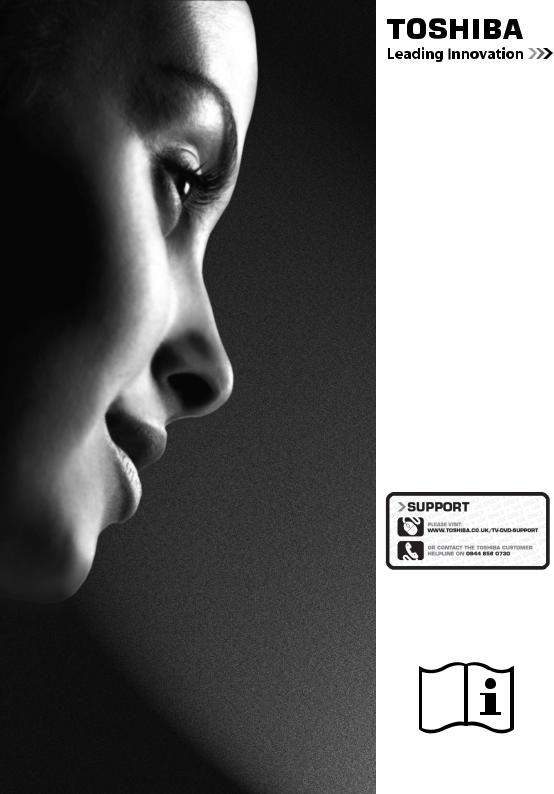
19DL834B
22DL834B
DIGITAL Series
"Register your TV online at: www.toshiba.co.uk/registration”
OWNER’S MANUAL
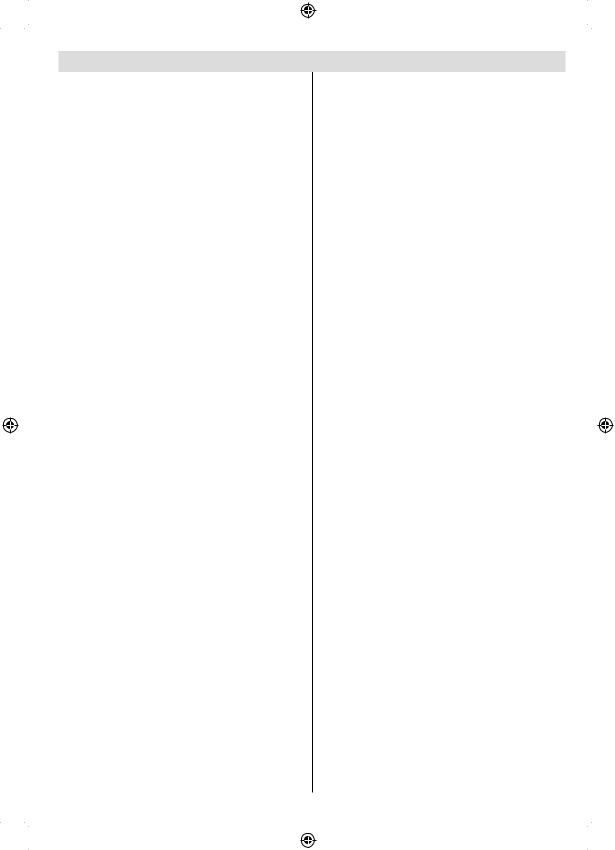
Contents |
|
Safety Precautions ................................................. |
3 |
Air Circulation ..................................................... |
3 |
Heat Damage...................................................... |
3 |
Mains Supply ...................................................... |
3 |
Warning ............................................................. |
3 |
Do ....................................................................... |
3 |
Do not ................................................................. |
3 |
Installation and Important Information .................... |
4 |
EXCLUSION CLAUSE........................................ |
4 |
Important safety information .................................. |
5 |
Removing the pedestal stand ............................. |
7 |
The Remote Control ............................................... |
8 |
Inserting Batteries and Effective Range of the |
|
Remote Control................................................... |
8 |
Connecting External Equipment............................. |
9 |
Connecting an HDMI® or DVI Device to the HDMI |
|
Input...................................................................... |
10 |
To Connect an HDMI Device ............................ |
10 |
To Connect a DVI Device.................................. |
10 |
Connecting a Computer......................................... |
11 |
To Connect a Computer..................................... |
11 |
Connecting a USB Memory................................... |
11 |
Connect a USB Memory.................................... |
11 |
USB Memory Connection .................................. |
11 |
Power Save Mode ................................................ |
12 |
Environmental Information ............................... |
12 |
Controlling the TV................................................. |
13 |
Switching on ..................................................... |
13 |
Using the Remote Control ................................ |
13 |
Using the Controls and Connections on the TV... |
13 |
Initial Installation .................................................. |
14 |
Auto Tuning .......................................................... |
15 |
Auto Tuning....................................................... |
15 |
Manual Tuning, Analogue Fine Tuning ................. |
16 |
Digital Aerial Manual Search............................. |
16 |
Digital Cable Manual Search ............................ |
16 |
Analogue Manual Search ................................. |
16 |
Analogue Fine Tune.......................................... |
16 |
General Operation................................................ |
17 |
Stereo and Bilingual Transmissions.................. |
17 |
Displaying Subtitles .......................................... |
17 |
Viewing Main Menu .......................................... |
17 |
Controlling Volume and Muting Sound ............. |
17 |
Selecting Programme Positions........................ |
17 |
Channel List, Sorting Programmes, Programme |
|
Locking ................................................................. |
18 |
Viewing Channel List ........................................ |
18 |
Moving a Channel............................................. |
18 |
Deleting a Channel ........................................... |
18 |
Renaming a Channel........................................ |
18 |
Locking a Channel............................................ |
18 |
Viewing Info Banner, Electronic Programme |
|
Guide.................................................................... |
19 |
Viewing Info Banner.......................................... |
19 |
Electronic Programme Guide............................ |
19 |
Language Selection.............................................. |
20 |
Language Settings............................................ |
20 |
Preferred....................................................... |
20 |
Current.......................................................... |
20 |
Digital Settings - Parental Control, Menu Lock, Set |
|
PIN........................................................................ |
21 |
Viewing Parental Control Menu ........................ |
21 |
Menu Lock ........................................................ |
21 |
Maturity Lock (*)................................................ |
21 |
Child Lock......................................................... |
21 |
Set PIN ............................................................. |
21 |
Configuring Picture Settings................................. |
22 |
Configuring Picture Settings ............................. |
22 |
Picture Mode..................................................... |
22 |
Contrast ............................................................ |
22 |
Brightness......................................................... |
22 |
Sharpness......................................................... |
22 |
Colour ............................................................... |
22 |
Colour Shift....................................................... |
22 |
Colour Temp ..................................................... |
22 |
Noise Reduction ............................................... |
23 |
Picture Zoom .................................................... |
23 |
Reset ................................................................ |
23 |
Changing Picture Format...................................... |
24 |
Configuring PC Picture Settings........................... |
25 |
PC Picture Settings (*)...................................... |
25 |
PC Position....................................................... |
25 |
Autoposition...................................................... |
25 |
H Position ......................................................... |
25 |
V Position.......................................................... |
25 |
Dot Clock .......................................................... |
25 |
Phase................................................................ |
25 |
Configuring Sound Settings.................................. |
26 |
Configuring Sound Settings.............................. |
26 |
Operating Sound Settings Menu Items............. |
26 |
Volume.............................................................. |
26 |
Equalizer (Only for speaker)............................. |
26 |
Balance (Only for speaker)............................... |
26 |
Headphone ....................................................... |
26 |
AVL ................................................................... |
26 |
Dynamic Bass................................................... |
26 |
Digital Out......................................................... |
26 |
Settings Menu Operation, Conditional Access ..... |
27 |
Configuring Your TV’s Settings ......................... |
27 |
Viewing Settings Menu ..................................... |
27 |
Conditional Access ........................................... |
27 |
Language.......................................................... |
27 |
Parental ............................................................ |
27 |
Timers............................................................... |
27 |
Date/Time Settings ........................................... |
27 |
Sources............................................................. |
27 |
Other Settings................................................... |
27 |
Using a Conditional Access Module ................. |
27 |
- 1 -
19&22DL834_DVD_A01_MB60_[GB]_(01-TV)_(IB_INTERNET)_DVB-TC |
_ |
(1911UK)_10071738_10071741.indd 1 |
07.10.2011 14:19:44 |
|
|
|
|
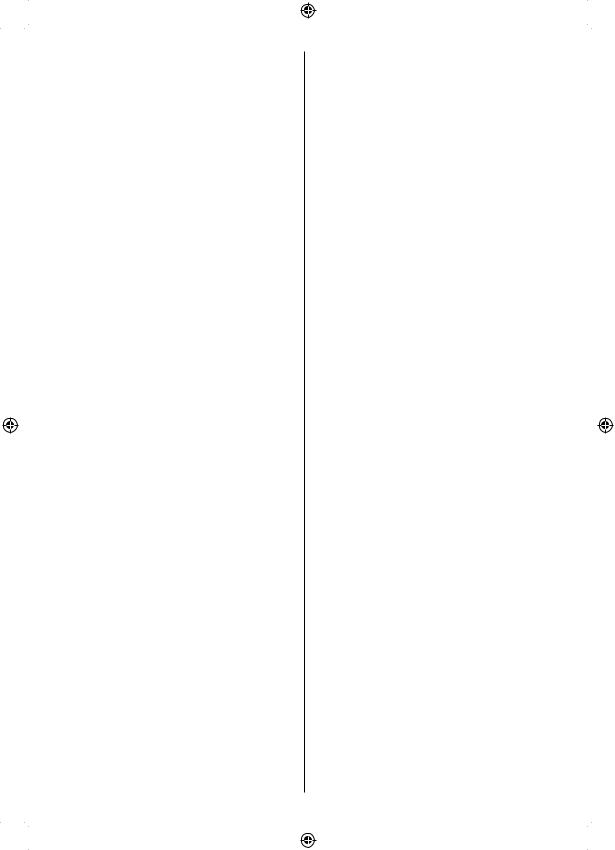
Setting Timers, Setting Date/Time........................ |
28 |
Timers............................................................... |
28 |
Setting Sleep Timer .......................................... |
28 |
Setting Programme Timers............................... |
28 |
Configuring Date/Time Settings........................ |
28 |
Source Settings, Other Controls........................... |
29 |
Configuring Source Settings............................. |
29 |
Input Selection.................................................. |
29 |
Configuring Other Settings - General ............... |
29 |
Operation.......................................................... |
29 |
Menu Timeout................................................... |
29 |
Scan Encrypted ............................................... |
29 |
Other Controls ...................................................... |
30 |
Backlight ........................................................... |
30 |
Power Save Mode ........................................... |
30 |
Blue Background .............................................. |
30 |
Software Upgrade............................................. |
30 |
Hard of Hearing ................................................ |
30 |
Audio Description.............................................. |
30 |
Auto TV Off ....................................................... |
30 |
Broadcast Type................................................. |
30 |
Standby Search (*) .......................................... |
31 |
Full Mode (optional).......................................... |
31 |
Teletext language.............................................. |
31 |
HDMI True Black............................................... |
31 |
USB Media Browser ............................................. |
32 |
Manual Start ..................................................... |
32 |
Auto Start.......................................................... |
32 |
Playing MP3 Files............................................. |
32 |
Viewing JPEG Files .......................................... |
33 |
Slideshow Feature............................................ |
33 |
Video Playback ................................................. |
34 |
Media Browser Settings.................................... |
34 |
To Close the Media Player................................ |
34 |
Analogue Text Services ........................................ |
35 |
Analogue Text Services .................................... |
35 |
Using Text Button -TEXT .................................. |
35 |
Acessing Sub-Pages ........................................ |
35 |
Revealing Concealed Text................................ |
35 |
Holding a Page ................................................. |
35 |
To display an initial page................................... |
35 |
Appendix A: PC Input Typical Display Modes....... |
36 |
Appendix B: AV and HDMI Signal Compatibility |
|
(Input Signal Types).............................................. |
37 |
Appendix C: Supported File Formats for USB |
|
Mode..................................................................... |
38 |
Appendix D: PIN Information ............................... |
38 |
Specifications and Accessories ............................ |
39 |
License Information .............................................. |
40 |
Questions and Answers........................................ |
41 |
- 2 -
19&22DL834_DVD_A01_MB60_[GB]_(01-TV)_(IB_INTERNET)_DVB-TC |
_ |
(1911UK)_10071738_10071741.indd 2 |
07.10.2011 14:19:46 |
|
|
|
|
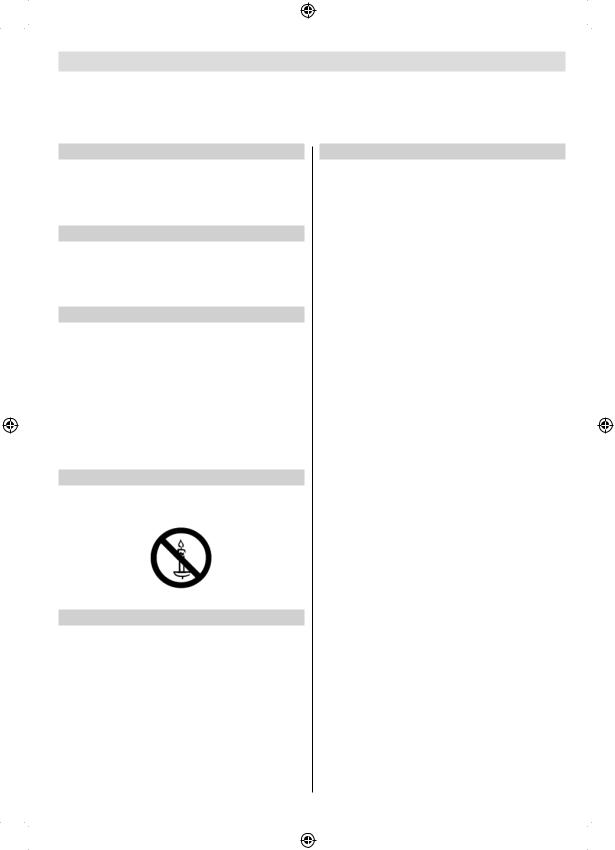
Safety Precautions
This equipment has been designed and manufactured to meet international safety standards but, like any electrical equipment, care must be taken to obtain the best results and for safety to be assured. Please read the points below for your own safety. They are of a general nature, intended to help with all electronic consumer products and some points may not apply to the goods you have just purchased.
Air Circulation
Leave more than 10cm clearance around the television to allow adequate ventilation. This will prevent overheating and possible damage to the television. Dusty places should also be avoided.
Heat Damage
Damage may occur if the television is left in direct sunlight or near a heater. Avoid places subject to extremely high temperatures or humidity, or locations where the temperature is likely to fall below 5°C (41°F).
Mains Supply
The set should be operated only from a 220-240 V AC 50 Hz outlet. DO ensure that the television is not standing on the mains lead. DO NOT cut off the mains plug from this equipment, this incorporates a special Radio Interference Filter, the removal of which will impair its performance. In the UK, the fuse fitted in this plug is approved by ASTA or BSI to BS1362. It should only be replaced by a correctly rated and approved type and the fuse cover must be refitted.
IF IN DOUBT PLEASE CONSULT A COMPETENT
ELECTRICIAN.
Warning
To prevent the spread of fire, keep candles or other open flames away from this product at all times.
Do
DO read the operating instructions before you attempt to use the equipment.
DO ensure that all electrical connections (including the mains plug, extension leads and interconnections between pieces of equipment) are properly made and in accordance with the manufacturers’ instructions. Switch off and withdraw the mains plug before making or changing connections.
DO consult your dealer if you are ever in doubt about the installation, operation or safety of your equipment.
DO be careful with glass panels or doors on equipment.
Do not
DON’T remove any fixed cover as this may expose dangerous voltages.
DON’T obstruct the ventilation openings of the equipment with items such as newspapers, tablecloths, curtains, etc. Overheating will cause damage and shorten the life of the equipment.
DON’T allow electrical equipment to be exposed to dripping or splashing or objects filled with liquids, such as vases, to be placed on the equipment.
DON’T place hot objects or naked flame sources, such as lighted candles or nightlights on, or close to equipment. High temperatures can melt plastic and lead to fires.
DON’T use makeshift stands and NEVER fix legs with wood screws. To ensure complete safety, always fit the manufacturers’ approved stand, bracket or legs with the fixings provided according to the instructions.
DON’T leave equipment switched on when it is unattended, unless it is specifically stated that it is designed for unattended operation or has a standby mode. Switch off by withdrawing the plug, make sure your family know how to do this. Special arrangements may need to be made for people with disabilities.
DON’T continue to operate the equipment if you are in any doubt about it working normally, or it is damaged in any way - switch off, withdraw the mains plug and consult your dealer.
WARNING - excessive sound pressure from earphones or headphones can cause hearing loss.
ABOVE ALL - NEVER let anyone, especially children, push or hit the screen, push anything into holes, slots or any other openings in the case.
NEVER guess or take chances with electrical equipment of any kind - it is better to be safe than sorry.
THE MAINS PLUG IS USED AS A DISCONNECTING DEVICE AND THEREFORE SHOULD BE READILY OPERABLE.
Note : Interactive video games that involve shooting a “gun” type of joystick at the on-screen target may not work with this TV.
- 3 -
19&22DL834_DVD_A01_MB60_[GB]_(01-TV)_(IB_INTERNET)_DVB-TC |
_ |
(1911UK)_10071738_10071741.indd 3 |
07.10.2011 14:19:46 |
|
|
|
|
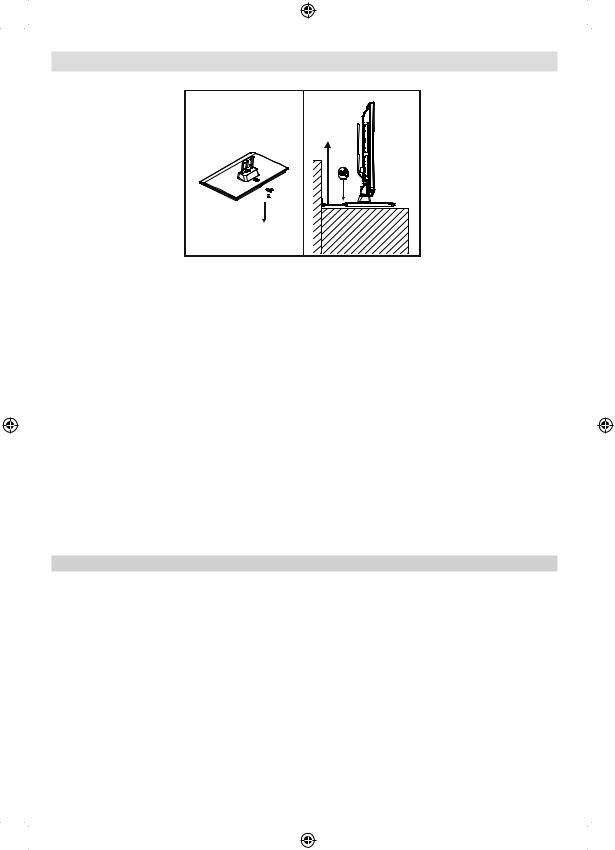
Installation and Important Information
Where to install
Sturdy tie 


(as short as possible)
P Clip 

P Clip
“P” Clip position on TV is dependent on model.
* Button and stand style is dependent on model.
Locate the television away from direct sunlight and strong lights. Soft, indirect lighting is recommended for comfortable viewing. Use curtains or blinds to prevent direct sunlight falling on the screen.
Place the TV on a stable, level surface that can support the weight of the TV. In order to maintain stability and prevent it falling over, secure the TV to a wall using a sturdy tie to the clip on TV. Install the P clip under the stand as shown in the above illustration.
The LCD display panels are manufactured using an extremely high level of precision technology; however, sometimes
some parts of the screen may be missing picture elements or have luminous spots. This is not a sign of a malfunction.
Make sure the television is located in a position where it cannot be pushed or hit by objects, as pressure will break or damage the screen. Also, please be certain that small items cannot be inserted into slots or openings in the case.
Cleaning the screen and cabinet…
Turn off the power, and clean the screen and cabinet with a soft, dry cloth. We recommend that you do not use any proprietary polishes or solvents on the screen or cabinet as this may cause damage.
Please take note
The digital reception function of this television is only effective in the countries listed in the “Country” section during the first time installation menu. Depending on country/area, some of this television’s functions may not be available. Reception of future additional or modified services can not be guaranteed with this television.
If stationary images generated by 4:3 broadcasts, text services, channel identification logos, computer displays, video games, on screen menus, etc. are left on the television screen for any length of time, they could become conspicuous. It is always advisable to reduce both the brightness and contrast settings.
Very long, continuous use of the 4:3 picture on a 16:9 screen may result in some retention of the image at the 4:3 outlines. This is not a defect of the LCD TV and is not covered under the manufacturer’s warranty.
Regular use of other size modes will prevent permanent retention.
EXCLUSION CLAUSE
Toshiba shall under no circumstances be liable for loss and/or damage to the product caused by:
i)fire;
ii)earthquake;
iii)accidental damage;
iv)intentional misuse of the product;
v)use of the product in improper conditions;
vi)loss and/or damage caused to the product whilst in the possession of a third party;
vii)any damage or loss caused as a result of the owner’s failure and/or neglect to follow the instructions set out in the owner’s manual;
viii)any loss or damage caused directly as a result of misuse or malfunction of the product when used simultaneously with associated equipment;
Furthermore, under no circumstances shall Toshiba be liable for any consequential loss and/or damage including but not limited to the following, loss of profit, interruption of business, the loss of recorded data whether caused during normal operation or misuse of the product.
Note: A Toshiba wall bracket or stand, where available, must be used.
- 4 -
19&22DL834_DVD_A01_MB60_[GB]_(01-TV)_(IB_INTERNET)_DVB-TC |
_ |
(1911UK)_10071738_10071741.indd 4 |
07.10.2011 14:19:46 |
|
|
|
|

Important safety information
WHEN THIS UNIT IS PLUGGED INTO THE WALL OUTLET, DO NOT PLACE YOUR EYES CLOSE TO THE OPENINGS TO LOOK INTO THE INSIDE OF THIS UNIT.
USE OF CONTROLS OR ADJUSTMENTS OR PERFORMANCE OF PROCEDURES OTHER THAN THOSE SPECIFIED HEREIN MAY RESULT IN HAZARDOUS RADIATION EXPOSURE.
DO NOT OPEN COVERS AND DO NOT REPAIR YOURSELF. REFER SERVICING TO QUALIFIED PERSONNEL.
Headphone Warning
Loud music can damage your hearing irreversibly. Do not set the volume to a high level when listening through headphones, particularly for extended listening periods.
Information for the DVB-T function
•Any function relative to the digital television (with the DVB logo) is available only within the country or area where such signals are transmitted. Verify with the salesperson if it is possible to receive a DVB-T signal in the zone where you live.
•Even if the television conforms to the DVB-T specifications, the compatibility to future digital DVB-T transmissions is not guaranteed.
•Some digital television functions may not be available in some countries.
•The DVB-T system present in this device is FTA (Free to air).
•DVB is a registered trademark of the DVB Project. This logo indicates that the product is compliant with European Digital Broadcasting.
Possible Adverse Effects on LCD Screen
If a fixed (non-moving) pattern remains on the LCD screen for long periods of time, the image can become permanently retained on the LCD TV panel and cause subtle but permanent ghost images. This type of damage is NOT COVERED BY YOUR WARRANTY. Never leave your TV on for long periods of time while it is displaying the following formats or images:
•Fixed Images, such as stock tickers, video game patterns, TV station logos, and websites.
•Special Formats that do not use the entire screen. For example, viewing letterbox style (16:9) media on a normal (4:3) display (Black bars at top and bottom of screen); or viewing normal style (4:3) media on a widescreen (16:9) display (Black bars on left and right sides of screen).
IMPORTANT INFORMATION
TV Installation
If a television is not positioned in a sufficiently stable location, it can be potentially hazardous due to falling. Many injuries, particularly to children, can be avoided by taking simple precautions such as:
•Using stands recommended by the manufacturer of the television.
•Only using furniture that can safely support the television.
•Ensuring the television is not overhanging the edge of the supporting furniture.
•Not placing the television on tall furniture (for example, cupboards or bookcases) without anchoring both the furniture and the television to a suitable support.
•Not standing the television on cloth or other materials placed between the television and supporting furniture.
•Educating children about the dangers of climbing on furniture to reach the television or its controls.
Place the TV on a stable, level surface that can support the weight of the TV. In order to maintain stability and prevent it from falling over, secure the TV to a wall using a sturdy tie to the clip on the back of the table top stand.
This unit has been produced according to all current safety regulations. The following safety tips should safeguard users against careless use and the dangers related to such use.
• Although this unit has been carefully manufactured and rigorously checked prior to leaving the factory as with all electrical appliances, it is possible for problems to develop. If you notice smoke, an excessive build-up of heat or any other unexpected phenomena, you should disconnect the plug from the mains power socket immediately.
- 5 -
19&22DL834_DVD_A01_MB60_[GB]_(01-TV)_(IB_INTERNET)_DVB-TC |
_ |
(1911UK)_10071738_10071741.indd 5 |
07.10.2011 14:19:47 |
|
|
|
|
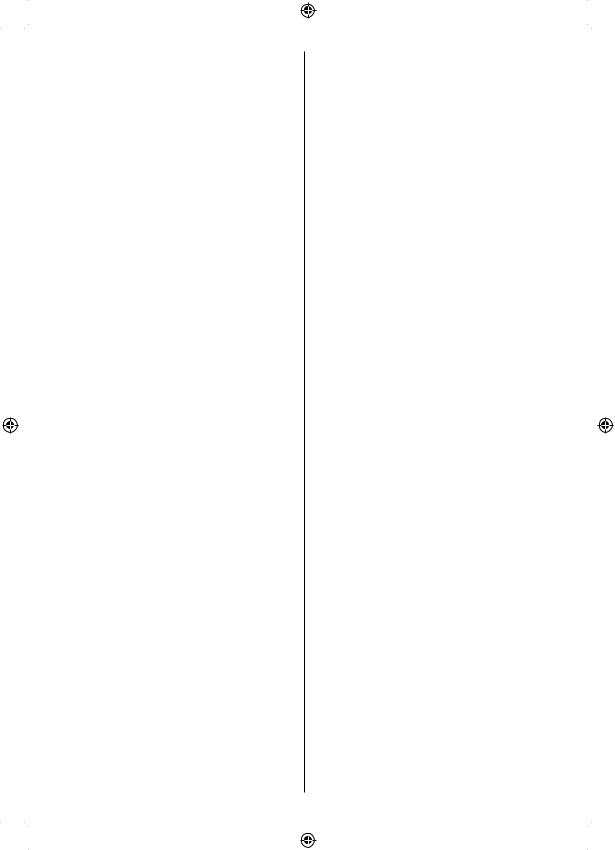
Important safety information (continued) |
||
• Ensure that the unit is sufficiently ventilated! Never place it |
• The unit becomes warm when in operation. Do not place |
|
next to or underneath curtains! |
any covers or blankets on the unit in order to prevent |
|
• This set should only be connected to a 220-240V AC 50Hz |
overheating. |
|
|
||
mains power supply. Do not attempt to connect it to any other |
The ventilation holes should not be blocked. Do not set up |
|
type of supply. |
near radiators. Do not place in direct sunshine. |
|
• The socket outlet must be installed near the equipment and |
• When placing on a shelf, allow at least 10 cm clearance |
|
is easily accessible. |
space around the whole unit. |
|
• Do not open this unit. An attempt to repair the unit by a |
• The unit shall not be exposed to dripping or splashing, and |
|
non-expert could be dangerous and potentially cause a fire |
no objects filled with liquids, such as vases, shall be placed |
|
hazard. All repairs must be carried out by qualified service |
on the apparatus. |
|
personnel only. |
• Liquids spilled into the unit can cause serious damage. |
|
• Keep away from rodents. Rodents (and also cockatiels) |
||
Switch the set off and disconnect the mains power supply, |
||
enjoy biting electric flexes. They can cause a short circuit |
then consult a qualified service person before attempting to |
|
(fire hazard!) and receive a fatal electric shock. |
use the unit again. |
|
• Always hold the plug when disconnecting the unit from |
• Moisture condensation occurs, for example, when you pour |
|
the socket outlet. Do not pull on flex. The flex can become |
a cold drink into a glass on a warm day and drops of water |
|
overloaded and cause a short circuit. |
form on the outside of the glass. In the same way, moisture |
|
• Use a soft, dry cloth to clean the unit. |
may condense on this unit’s internal optical pick-up lens, one |
|
of the most crucial internal parts of the unit. |
||
• Set up unit so that no one will trip over the flex. |
||
• Moisture condensation occurs in the following situations: |
||
• This unit is recommended to be installed on shock-free |
||
- When you move the unit from a cold place to a warm |
||
benches in order to avoid any danger from falling. |
||
place. |
||
• Take note that toddlers can pull the unit down from a table or |
||
- When you use the unit in a room where the heater was |
||
cupboard by means of its flex. Children can hurt themselves |
||
just turned on. |
||
when doing this. |
||
- When you use the unit in an area where cold air from an air |
||
• Do not use the unit near heat sources. The casing and flex |
||
conditioner directly hits the unit. |
||
could be damaged by the intensity of the heat. |
||
- When you use the unit in a humid place. |
||
• The screen is made of glass and can break if damage is done |
||
|
||
to it. Be careful when collecting sharp edged glass splitters. |
• Never use the unit when moisture condensation may |
|
• If you intend to wall mount the unit, contact the shop where |
occur. |
|
|
||
you purchased the unit for advice, and leave the installation |
• Using the unit when moisture condensation exists may |
|
work to professionals. Improper installation can cause |
damage its own internal parts and discs. Connect the power |
|
damage and/or injuries. |
cord of the unit to the wall outlet, turn on the unit, remove the |
|
• When installing the set on a wall, allow at least 10 cm |
disc, and leave it for two or three hours. After two or three |
|
hours, the unit will warm up and moisture will be evaporated. |
||
clearance between the rear of the set and the wall. Clearance |
||
Leaving the TV connected to the wall outlet will help prevent |
||
of less than 10 cm will obstruct the vents and cause |
||
moisture condensation in the unit. |
||
overheating to the interior of the set, resulting in faults or |
||
|
||
damage to the set. |
• Never place hot objects or open flame sources, such as |
|
• Taking fall-prevention measures |
lighted candles or night lights, on or close to the TV. High |
|
temperatures can melt plastic and lead to fires. |
||
- If these measures are not taken, the unit can fall and cause |
||
|
||
damage and/or injuries. |
|
|
- Contact the shop where you purchased the unit to obtain |
|
|
full details of the measures. |
|
|
• When a TV stand is used, |
|
|
- Ensure the unit is fully on the stand and placed in the |
|
|
centre. |
|
|
- Do not leave the stand doors open. You could be hurt as |
|
|
a result of the unit falling or breaking, or your fingers being |
|
|
caught or jammed. Take extra precautions if you have |
|
|
children. |
|
|
• Avoid placing the unit on any surfaces that may be subject |
|
|
to vibrations or shocks. |
|
|
• To protect the unit during a thunder storm, unplug the AC |
|
|
power cord and disconnect the aerial. |
|
|
Caution: Do not touch the aerial connector. |
|
|
• When you leave your home for a long period of time, unplug the AC power cord for safety.
- 6 -
19&22DL834_DVD_A01_MB60_[GB]_(01-TV)_(IB_INTERNET)_DVB-TC |
_ |
(1911UK)_10071738_10071741.indd 6 |
07.10.2011 14:19:48 |
|
|
|
|
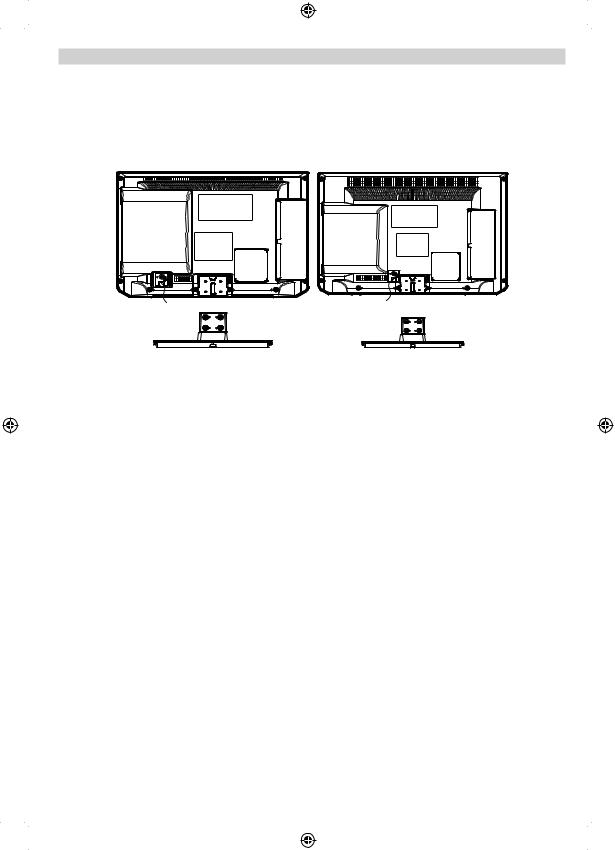
Removing the pedestal stand
(1) Carefully lay the front of the TV face down on a flat, cushioned surface such as a quilt or blanket. Leave the stand protruding over the edge of the surface.
Note: Extreme care should always be taken when removing the pedestal stand to avoid damage to the LCD panel.
(2)Remove the four screws on the stand. This will allow removal of the pedestal stand.
(3)Once you have removed four screws holding the pedestal stand in place, remove the pedestal stand from the TV by removing away from the TV.
*For 19DL834 model |
* For 22DL834 model |
- 7 -
19&22DL834_DVD_A01_MB60_[GB]_(01-TV)_(IB_INTERNET)_DVB-TC |
_ |
(1911UK)_10071738_10071741.indd 7 |
07.10.2011 14:19:48 |
|
|
|
|
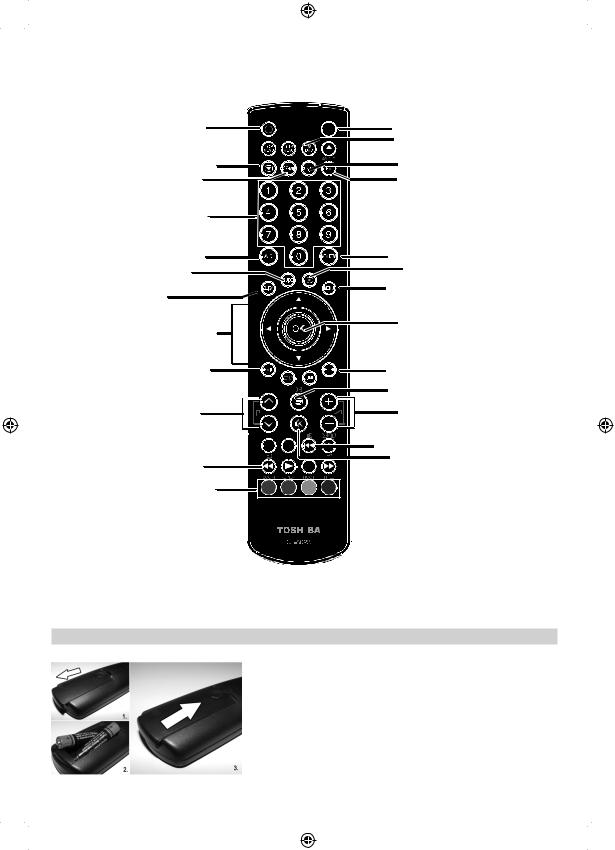
The Remote Control
Simple at-a-glance reference of your remote control.
Standby/ On mode |
|
|
|
|
|
Operation LED |
|||||
|
|
|
|
||||||||
|
|
|
|
||||||||
|
|
|
|
|
|
|
|
|
|
Switch to TV or DVD mode |
|
Freeze Picture |
|
|
|
Subtitle on/off |
|||||||
|
|
|
|||||||||
|
|
|
|||||||||
Mono-Stereo / Dual I-II |
|
|
|
Teletext |
|||||||
To select TV |
|
|
|
|
|||||||
programme number |
|
|
|
|
|||||||
Audio description |
|
|
|
Analogue/Digital broadcasts |
|||||||
Programme guide |
|
|
|
AV / Source |
|||||||
Quick Settings |
|
|
|
MENU On/Off |
|||||||
|
|
|
|
||||||||
Navigation Buttons |
|
|
|
OK / Confirm |
|||||||
|
|
|
|
||||||||
Exit menu |
|
|
|
Return to previous menu |
|||||||
|
|
|
|
|
|
|
|
|
|
Info |
|
To change channels |
|
|
|
To alter the volume |
|||||||
|
|
|
|
|
|
|
|
|
|
Reveal (in TXT mode) |
|
|
|
|
|
|
|
|
|
||||
|
|
|
|
|
|
|
|
|
|
To mute the sound |
|
Hold Page (in TXT mode) |
|||||||||||
|
|
|
|
||||||||
|
|
|
|
||||||||
Teletext Controls |
|
|
|
|
|||||||
|
|
|
|
|
|
|
|
|
|
|
|
|
|
|
|
|
|
|
|
|
|
|
|
Note: Buttons that are not indicated on the remote control illustration are not functional in TV mode.
Inserting Batteries and Effective Range of the Remote Control
Remove the back cover to reveal the battery compartment and make sure the batteries are inserted the right way round. Suitable battery types for this remote are AAA, IEC R03 1.5V.
Do not combine a used, old battery with a new one or mix battery types. Remove dead batteries immediately to prevent acid from leaking into the battery compartment. Dispose of them in a designated disposal area.
Warning: Batteries must not be exposed to excessive heat such as sunshine, fire or the like.
The performance of the remote control will deteriorate beyond a distance of five metres or outside an angle of 30 degrees from the centre of the television. If the operating range becomes reduced the batteries may need replacing.
- 8 -
19&22DL834_DVD_A01_MB60_[GB]_(01-TV)_(IB_INTERNET)_DVB-TC |
_ |
(1911UK)_10071738_10071741.indd 8 |
07.10.2011 14:19:50 |
|
|
|
|
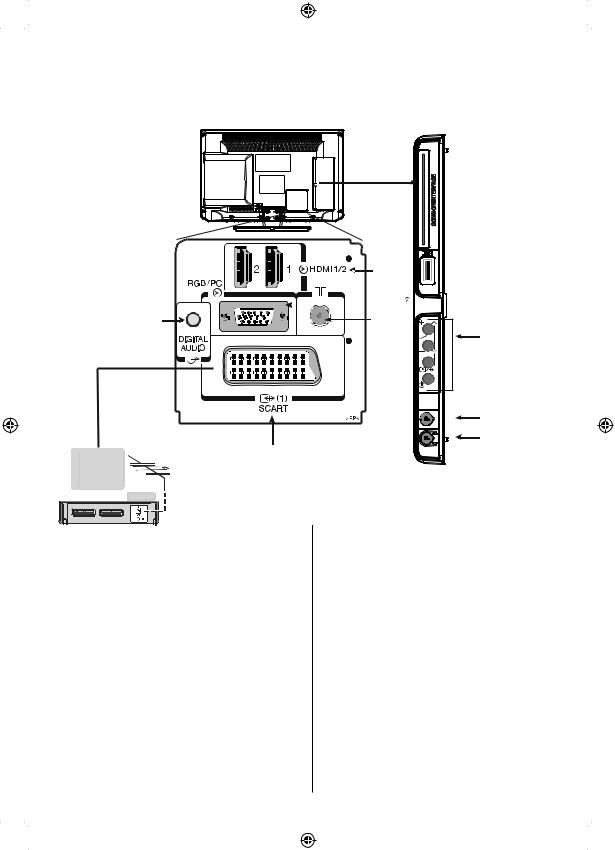
Connecting External Equipment
Before connecting any external equipment, remove the mains plug from the wall socket.
DIGITALAUDIO
Socket
* a decoder  could be Digital
could be Digital 
 Satellite, Free to
Satellite, Free to 

Air or any other compatible decoder.
decoder*
TV
Side View
USB

HDMI Input
Sockets
5Vdc
Max:500mA
RGB/PC
Input
Aerial
Input
COMMON INTERFACE
 The Common Interface is for a Conditional Access Module (CAM).
The Common Interface is for a Conditional Access Module (CAM).
 USB Input
USB Input
+/- Controls
 P/V-AV Button
P/V-AV Button
 Standby/On Button
Standby/On Button
AV |
SIDE AV Input |
|
SIDE |
||
|
||
|
Headphone |
SCART
Socket
Aerial cable:...........................................................
Connect the aerial to the ANT. socket on the rear of the TV.
SCART lead:..........................................................
If you use a decoder* or a media recorder, it is essential that the scart cable is connected to the TV.
Before running first time installation, any connected devices need to be set to standby mode.
The DIGITAL AUDIO socket enables the connection of a suitable surround sound system.
HDMI® (High-Definition Multimedia Interface) is for using with a DVD decoder or other equipment with digital audio and video output. It is designed for best performance with 1080i and 1080p high-definition video signals but will also accept and display VGA, 480i, 480p, 576i, 576p and 720p signals. PC format signals will also be displayed.
NOTE: Although this TV is able to connect to HDMI equipment, it is possible that some equipment may not operate correctly.
A wide variety of external equipment can be connected to the TV; therefore, the relevant owner’s manuals for all additional equipment must be referred to for exact instructions.
If the TV automatically switches over to monitor external equipment, return to normal TV by pressing the desired programme position button. To recall external equipment, press  button repeatedly to switch between sources.
button repeatedly to switch between sources.
Regardless of source’s property, audio output from the DIGITAL AUDIO socket cannot be copied.
- 9 -
19&22DL834_DVD_A01_MB60_[GB]_(01-TV)_(IB_INTERNET)_DVB-TC |
_ |
(1911UK)_10071738_10071741.indd 9 |
07.10.2011 14:19:52 |
|
|
|
|
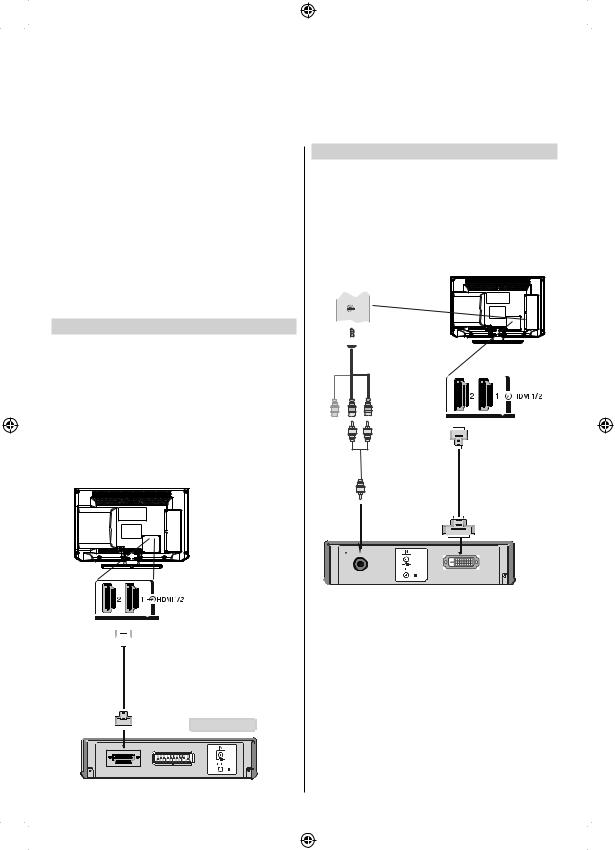
Connecting an HDMI® or DVI Device to the HDMI Input
The HDMI input on your TV receives digital audio and uncompressed digital video from an HDMI source device or uncompressed digital video from a DVI (Digital Visual Interface) source device.
This input is designed to accept HDCP (High-Bandwidth Digital-Content Protection) programme material in digital form from EIA/CEA-861-D–compliant [1] consumer electronic devices (such as a set-top box or DVD player with HDMI or DVI output).
NOTE:
•Some early HDMI equipment may not work properly with your latest HDMI TV.
•Supported Audio format: Linear PCM, sampling rate 32/44.1/48kHz.
To Connect an HDMI Device
Connect an HDMI cable (type A connector) to the HDMI terminal. For proper operation, it is recommended that you use an HDMI cable with the HDMI Logo ( ).
).
•If your HDMI connection is capable of 1080p and/or your TV is capable of refresh rates greater than 50Hz, you will need a Category 2 cable. Conventional HDMI/DVI cable may not work properly with this mode.
•HDMI cable transfers both video and audio. Separate analogue audio cables are not required (see illustration).
•To view the HDMI device video, press  button to select HDMI1 or HDMI2.
button to select HDMI1 or HDMI2.
HDMI Input  Sockets
Sockets
(Back)
To Connect a DVI Device
Connect an HDMI-to-DVI adaptor cable (HDMI type A connector) to the HDMI input socket and audio cables to the SIDE AV socket, using the supplied Side AV connection cable’s RED and WHITE inputs (see illustration).
•The recommended HDMI-to-DVI adaptor cable length is 6.6 ft (2m).
•An HDMI-to-DVI adaptor cable transfers video only. Separate analogue audio cables are required.
SIDEAV Input |
SIDE AV |

 SideAudio/Video
SideAudio/Video
 Connection Cable
Connection Cable
(Supplied)
HDMI Input
Sockets
Audio Cable
(Not supplied) HDMI to DVI
 Adapter Cable (not supplied)
Adapter Cable (not supplied)
NOTE:
To ensure that the HDMI or DVI device is reset properly, it is recommended that you follow these procedures:
•When turning on your electronic components, turn on the TV first, and then the HDMI or DVI device.
•When turning off your electronic components, turn off the HDMI or DVI device first, and then the TV.
HDMI device
- 10 -
19&22DL834_DVD_A01_MB60_[GB]_(01-TV)_(IB_INTERNET)_DVB-TC |
_ |
(1911UK)_10071738_10071741.indd 10 |
07.10.2011 14:19:55 |
|
|
|
|
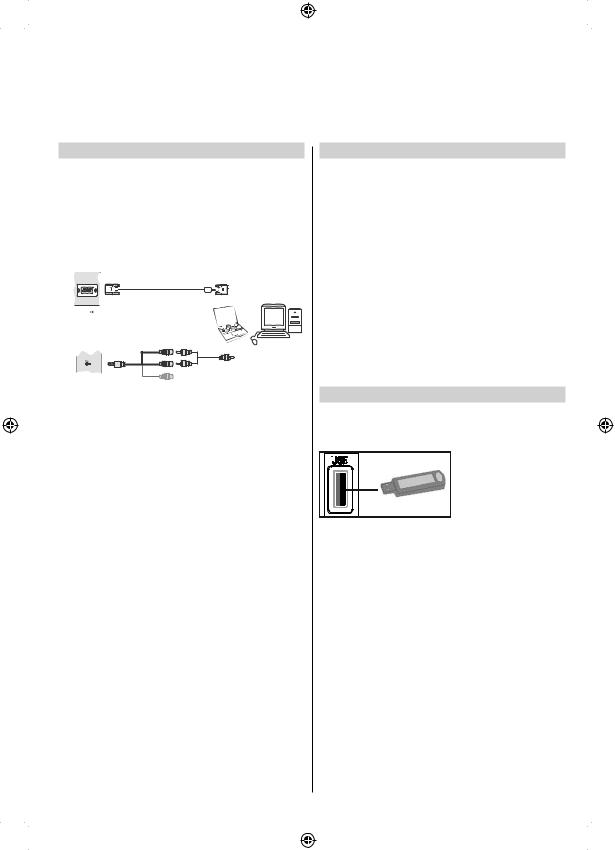
Connecting a Computer Connecting a USB Memory
To Connect a Computer
With either an RGB/PC or an HDMI connection, you can watch your computer’s display on the TV and hear the sound from the TV’s speakers.
When connecting a PC to the RGB/PC  input on TV, use an analogue RGB (15-pin) computer cable and use the SIDE AV socket with a PC audio cable (not supplied) for audio connection, using the supplied Side AV connection cable’s RED and WHITE inputs (see illustration).
input on TV, use an analogue RGB (15-pin) computer cable and use the SIDE AV socket with a PC audio cable (not supplied) for audio connection, using the supplied Side AV connection cable’s RED and WHITE inputs (see illustration).
|
|
PC VGA Cable |
|
|
(Not supplied) |
RGB/PC |
Input |
Or |
(back) |
|
|
|
|
Side Audio/Video |
|
|
Connection Cable |
|
|
(Supplied) |
SIDE AV |
|
PC Audio Cable |
SIDE AV Input |
(Not supplied) |
|
|
||
To use a PC, set the monitor output resolution on the PC before connecting it to the TV. To display the optimum picture, use the PC setting feature.
NOTE:
•Some PC models cannot be connected to this TV. An adaptor is not needed for computers with a compatible mini D-sub15-pin terminal.
•Depending on the DVD’s title and the specifications of the PC on which you are playing the DVD-Video, some scenes may be skipped or you may not be
able to pause during multiangle scenes.
Connect a USB Memory
•You can connect a USB memory to your TV by using the USB input of the TV. This feature allows you to display/play music, photo or video files stored in a
USB memory.
•It is possible that certain types of USB devices (e.g. MP3 Players) may not be compatible with this TV.
•You may back up your files before making any connections to the TV set in order to avoid any possible data loss. Note that manufacturer will not be responsible for any file damage or data loss.
•Do not pull out USB memory while playing a file.
CAUTION: Quickly plugging and unplugging USB devices, is a very hazardous operation. Especially, do not repeatedly quickly plug and unplug the drive. This may cause physical damage to the USB player
and especially the USB device itself.
USB Memory Connection
•Plug your USB memory to the USB input of the TV.
SIDE VIEW
USB

USB memory
- 11 -
19&22DL834_DVD_A01_MB60_[GB]_(01-TV)_(IB_INTERNET)_DVB-TC |
_ |
(1911UK)_10071738_10071741.indd 11 |
07.10.2011 14:19:59 |
|
|
|
|
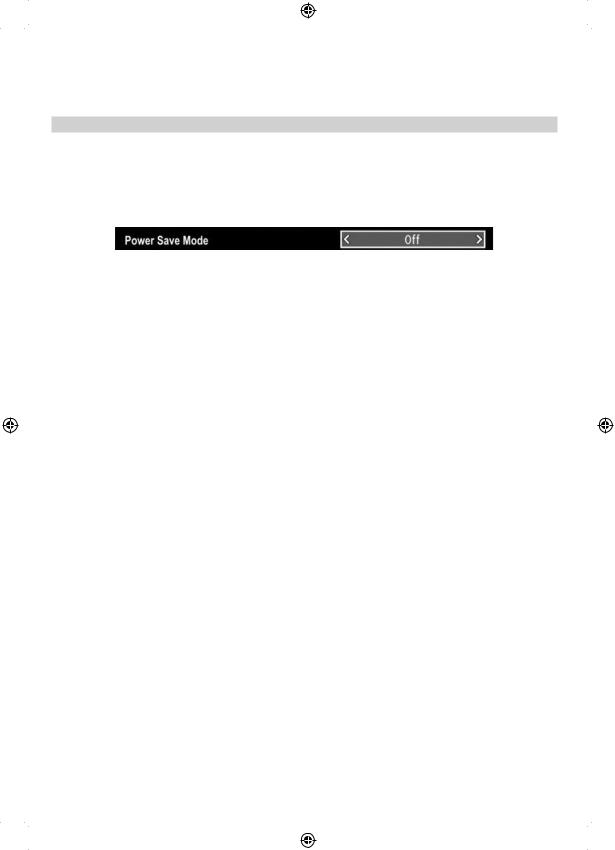
Power Save Mode
Environmental Information
•This television is designed to consume less energy to save environment.
•You not only help to save the environment but also can save money by reducing electricity bills, thanks to the energy efficiency feature of this TV. To reduce energy consumption, you should take the following steps:
•You can use Power Save Mode setting, located on page 30. If you set Power Save Mode as On, the TV will switch to energy-saving mode and luminance level of TV set will be decreased to optimum level. Note that some picture settings will be unavailable to be changed when the TV is in Power Save Mode.
•When the TV is not in use, please switch off or disconnect the TV from the mains plug. This will also reduce energy consumption.
•Disconnect power when going away for longer time.
•Note that annually, using the TV set in Power Save Mode has more power efficiency than disconnecting the TV from the mains plug instead of keeping stand-by mode. Therefore it is highly recommended to activate Power Save Mode setting to reduce your annual power consumption. And also it is recommended to disconnect the TV from the mains plug to save energy more when you do not use.
•Please helps us to save environment by following these steps.
•This television is designed to consume less energy.
•Harmful substances and contents that are dangerous to health, are eliminated in its design.
•This product is designed to endure longer and it is subject to recycling at the end of its service life.
•When the TV reaches the end of its service life, dispose the product in accordance with the proper recycling process as explained on page 40.
Repair Information
Please refer all servicing to qualified personnel. Only qualified personnel must repair the TV. Please contact your local dealer, where you have purchased this TV for further information.
- 12 -
19&22DL834_DVD_A01_MB60_[GB]_(01-TV)_(IB_INTERNET)_DVB-TC |
_ |
(1911UK)_10071738_10071741.indd 12 |
07.10.2011 14:20:00 |
|
|
|
|
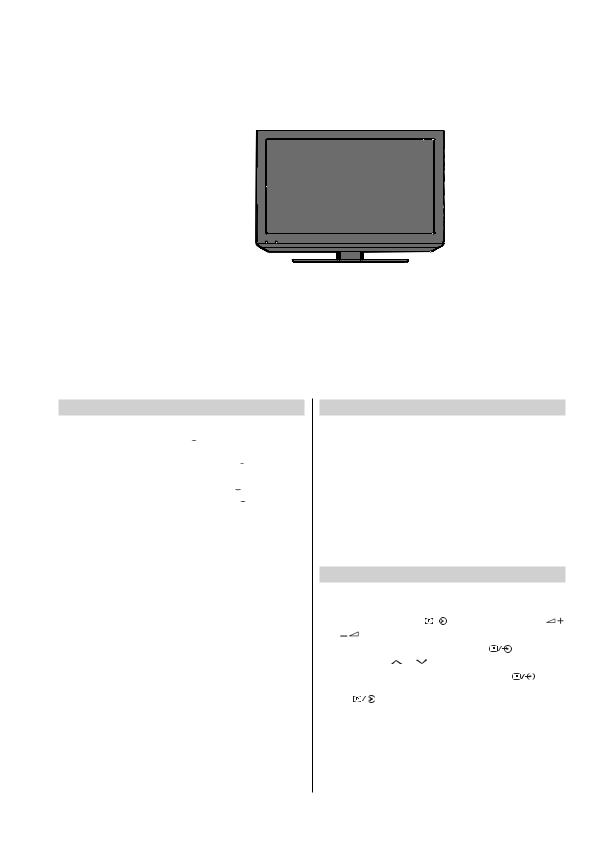
Controlling the TV
A wide variety of external equipment can be connected via the sockets located on the side and back of the
TV. Whilst all the necessary adjustments and controls for the TV are made using the remote control, the buttons on the left side of the TV may be used for some functions.
USB |
5Vdc |
Max:500mA |
 Remote Control Sensor Standby LED
Remote Control Sensor Standby LED
 +/- control/volume buttons
+/- control/volume buttons


 Programme / Volume / AV Function
Programme / Volume / AV Function
 Standby / On button
Standby / On button

 SIDEAV
SIDEAV
Switching on
If the standby LED is unlit, check that the mains plug is connected to the power and press  button on the left side of the TV to switch the television on. Then the LED lights up in green. If the picture does not appear, press
button on the left side of the TV to switch the television on. Then the LED lights up in green. If the picture does not appear, press  button on the remote control; it may take a few moments.
button on the remote control; it may take a few moments.
To put the television into Standby, press  button on the remote control. To view the television, press
button on the remote control. To view the television, press  button again. The picture may take a few seconds to appear.
button again. The picture may take a few seconds to appear.
Note: The active Standby LED may appear for a few moments when the TV is switched off.
For energy saving:
Turning the TV off at its mains supply, or un-plugging it, will cut energy use to nearly zero for all TV’s. This is recommended when the TV is not being used for a long time, e.g. when on holiday.
Reducing the brightness of the screen will reduce energy use. Energy efficiency cuts energy consumption and thus saves money by reducing electricity bills.
NOTE: Putting the TV into standby mode, will reduce energy consumption, but will still draw some power.
Using the Remote Control
Press MENU button on the remote control to see the menus.
The main menu appears as a group of icons each for a menu option. Press Left or Right button to select a topic, and press OK button.
In sub menu screen mode the menu appears as a list. Press Up or Down button to select a topic, and press OK button.
To use the options press Up or Down button on the remote control to move up and down through them and OK button, Left or Right button to select the required choice. Follow the on screen instructions. The functions of each menu are described in the manual.
Using the Controls and Connections on the TV
Using the control buttons on the side of the TV:
• To alter the volume press  or
or  button. If the volume
button. If the volume
does not change, press |
button twice and press |
|||
or |
button again. |
|
|
|
• To alter the programme position press |
button once |
|||
and then press |
or |
button. |
|
|
• To select an external input, press and hold |
button |
|||
until “Sources list” is displayed. To select an external input, press button repeatedly until the appropriate input source is selected.
NOTE: The USB socket has limited functionality, and Toshiba can take no responsibility for damage to other connected equipment.
Please always refer to the owner’s manual of the equipment to be connected for full details.
- 13 -
19&22DL834_DVD_A01_MB60_[GB]_(01-TV)_(IB_INTERNET)_DVB-TC |
_ |
(1911UK)_10071738_10071741.indd 13 |
07.10.2011 14:20:00 |
|
|
|
|
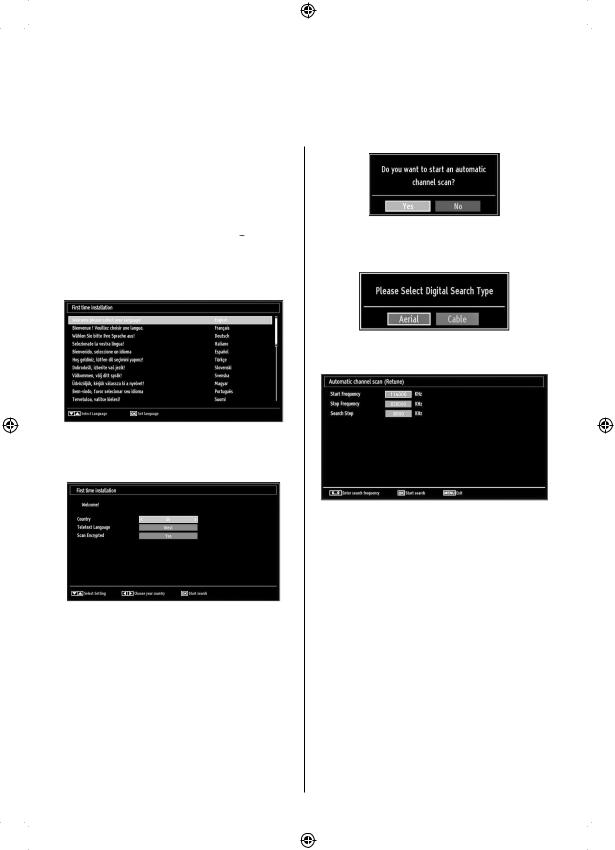
Initial Installation
Before switching on the TV, put your decoder and media recorder to Standby if they are connected and ensure the aerial is connected to your TV. To set up the TV, use the buttons on the remote control as detailed on page 8.
IMPORTANT: Ensure that the aerial or cable is connected and a Common Interface module is not inserted before switching on the TV for the first time installation.
1.Connect the mains plug and switch the TV to on using the side standby switch. If the TV does not switch on, press any numbered or  button on the remote control, then the language selection menu will be displayed. This screen will appear the first time that the TV is switched on and each time the TV is reset.
button on the remote control, then the language selection menu will be displayed. This screen will appear the first time that the TV is switched on and each time the TV is reset.
2.By pressing Up or Down button, highlight the language you want to set and press OK button. The following message will be displayed next:
3.By pressing Left or Right button, select the country you want to set and press Down button to highlight Teletext Language option. Use
Left or Right button to select desired Teletext
Language.
4.Press Down button after setting Teletext Language option. Scan Encrypted will be then highlighted. You can set Scan Encrypted as Yes if you want to scan coded stations.
5.Press OK button on the remote control to continue and the following message will be displayed on the screen:
6.Select Yes button by using Left or Right button and press OK button to continue. Afterwards, the following OSD will be displayed on the screen:
7.If you select Cable option, the following screen will be displayed:
8.You can select frequency ranges from this screen. For highlighting lines you see, use Up or Down button. You can enter the frequency range manually by using the numeric buttons on the remote control. Set Start and Stop Frequency as desired by using numeric buttons on the remote control. After this operation, you can set Search Step as 8000 kHz or 1000 kHz. If you select
1000 kHz, the TV will perform search process in a detailed way. Searching duration will thus increase accordingly. When finished, press OK button to start automatic search.
9.If you select Aerial option from the Search Type screen, the television will search for broadcasts.
10.The Auto tuning screen will appear and the television will start to search for available stations. The progress bar will move along the line. You must allow the television to complete the search. The following OSD will be displayed on the screen and the television will search for digital and analogue TV broadcasts:
- 14 -
19&22DL834_DVD_A01_MB60_[GB]_(01-TV)_(IB_INTERNET)_DVB-TC |
_ |
(1911UK)_10071738_10071741.indd 14 |
07.10.2011 14:20:01 |
|
|
|
|
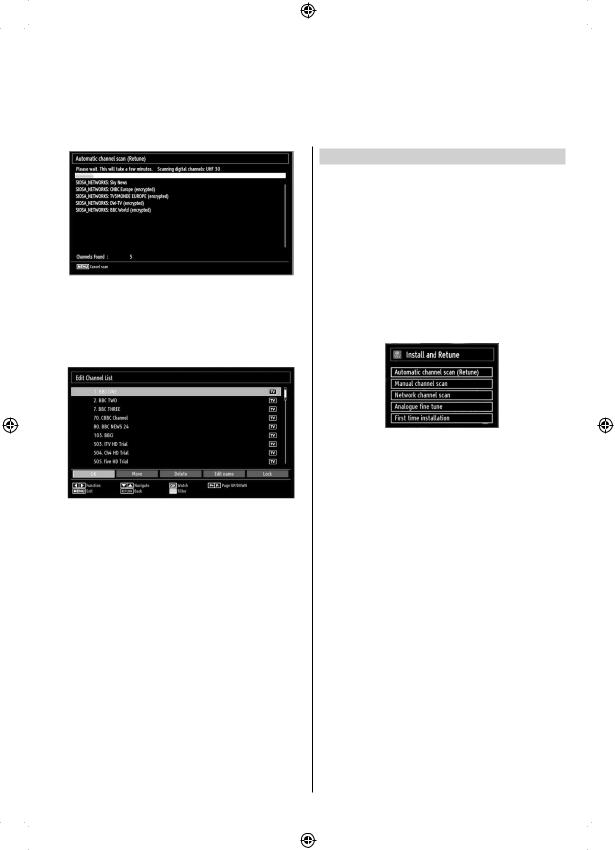
Initial Installation - continued |
Auto Tuning |
Note: You can press MENU button to cancel.
•After the available stations are stored, Channel List will be displayed on the screen. If you like the sort channels, according to the LCN, please select Yes and then press OK button (if available).
• Press OK button to quit channel list and watch TV.
Note:
Do not turn off the TV while initializing first time installation.
Auto Tuning
As new services are broadcast, it will be necessary to retune the television in order to view them.
•Auto Tuning will completely retune the television and can be used to update the channel list. It is recommended that Auto Tuning is run periodically to ensure that all new services are added. All current channels and settings, i.e. locked channels, will be lost.
•Press MENU button on the remote control and select
Install and Retune by using Left or Right button. Press OK button and the following menu screen will be displayed.
•Select Automatic Channel Scan by using Up or
Down button and press OK button.Automatic Channel Scan options will be displayed. You can select Digital
Aerial, Analogue or Digital Aerial-Analogue tuning using Up or Down and OK buttons.
Auto Channel Scan Menu Operation
Digital Aerial: Searches and stores aerial DVB stations.
Digital Cable: Searches and stores cable DVB stations.
Analogue: Searches and stores analogue stations.
Digital Aerial & Analogue: Searches and stores both analogue and aerial DVB stations.
Digital Cable & Analogue: Searches and stores both analogue and cable DVB stations.
•Whenever you select an automatic search type and press OK button, a confirmation screen will appear on the screen. To start installation process, select
Yes, to cancel select No by using Left or Right and OK button.
•After auto channel scan type is set and selected and confirmed, installation process will start and progress bar will move along. Press MENU button to cancel process. In such a case, located channels are not stored. The television will start to search for all available stations. You must allow the television to complete the search.
- 15 -
19&22DL834_DVD_A01_MB60_[GB]_(01-TV)_(IB_INTERNET)_DVB-TC |
_ |
(1911UK)_10071738_10071741.indd 15 |
07.10.2011 14:20:01 |
|
|
|
|
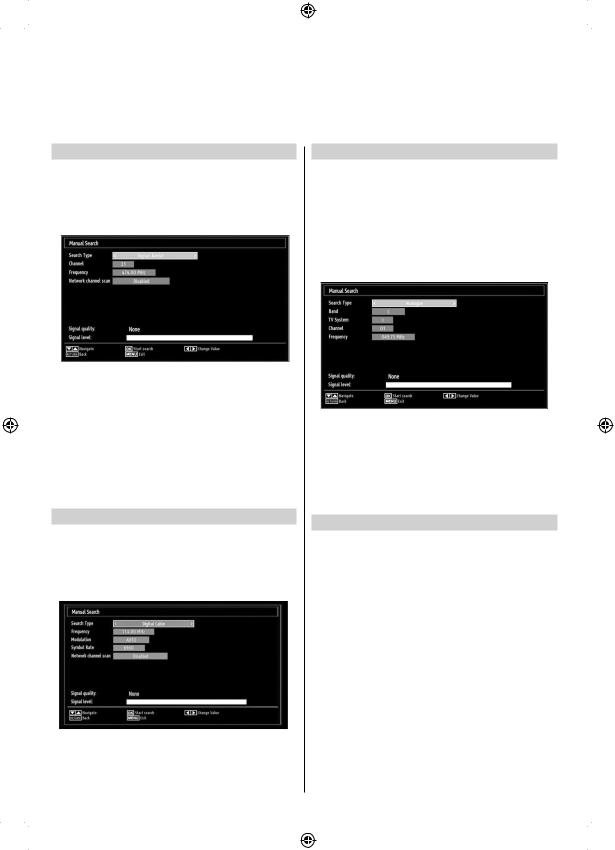
Manual Tuning, Analogue Fine Tuning
The television can be tuned-in manually using Manual Search feature.
Digital Aerial Manual Search
The feature is available for service engineers or can be used for direct channel entry if the multiplex channel is known.
•Select Manual channel scan from the Install and Retune menu and press OK.
•After selecting search type as Digital Aerial, you can enter the multiplex or frequency number using the numeric buttons and press OK button to search.
•Enter the multiplex number using the numeric buttons. The television will automatically search for that multiplex. When the multiplex is found any channels not currently on the programme list will be added and the programme information at the top of the screen will be updated.
•Repeat as necessary.
Digital Cable Manual Search
•In cable manual scan, you can enter frequency, modulation, symbol rate and network channel scan options. After selecting search type as Digital Cable, you can set the desired options and press OK button to search.
Analogue Manual Search
The television can be tuned-in manually. For example: if the television cannot be connected to a media recorder/decoder with a SCART lead or to tune-in a station on another System.
To allocate a programme position on the television for a decoder and media recorder: turn the decoder on, insert a pre-recorded film into the media recorder and press PLAY, then manually tune.
After selecting search type as Analogue, you can use Up or Down button to highlight an item and then press Left or Right button to set an option.
Enter the channel number or frequency using the numeric buttons. You can then press OK button to search. When the channel is located, any new channels that are not on the list will be stored.
Analogue Fine Tune
•Select Analogue Fine Tune from the Install and Retune menu by using Up or Down and OK buttons. Analogue fine tune screen will be displayed.
Analogue Fine Tune feature will not be available if there are no analogue channels, only digital channels and external sources stored.
•Use Left or Right button to set Fine Tune. When finished, press OK button.
- 16 -
19&22DL834_DVD_A01_MB60_[GB]_(01-TV)_(IB_INTERNET)_DVB-TC |
_ |
(1911UK)_10071738_10071741.indd 16 |
07.10.2011 14:20:02 |
|
|
|
|
